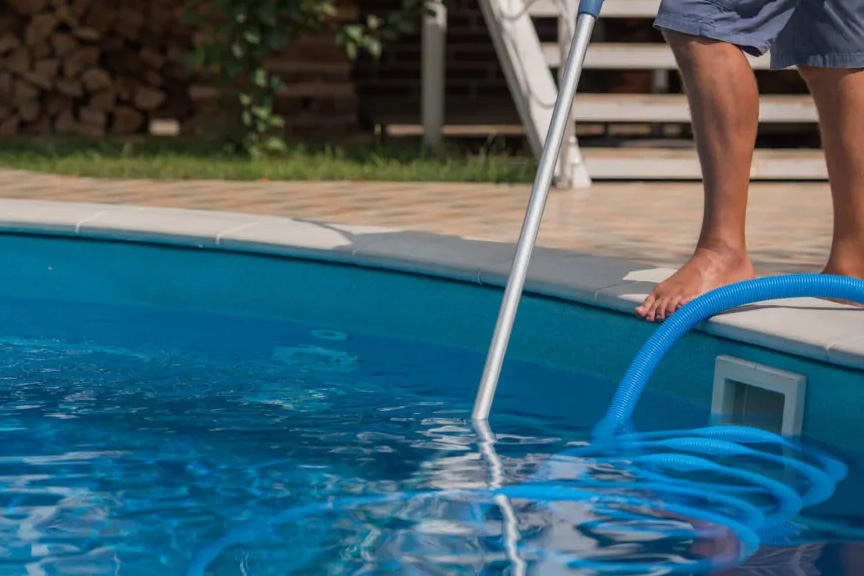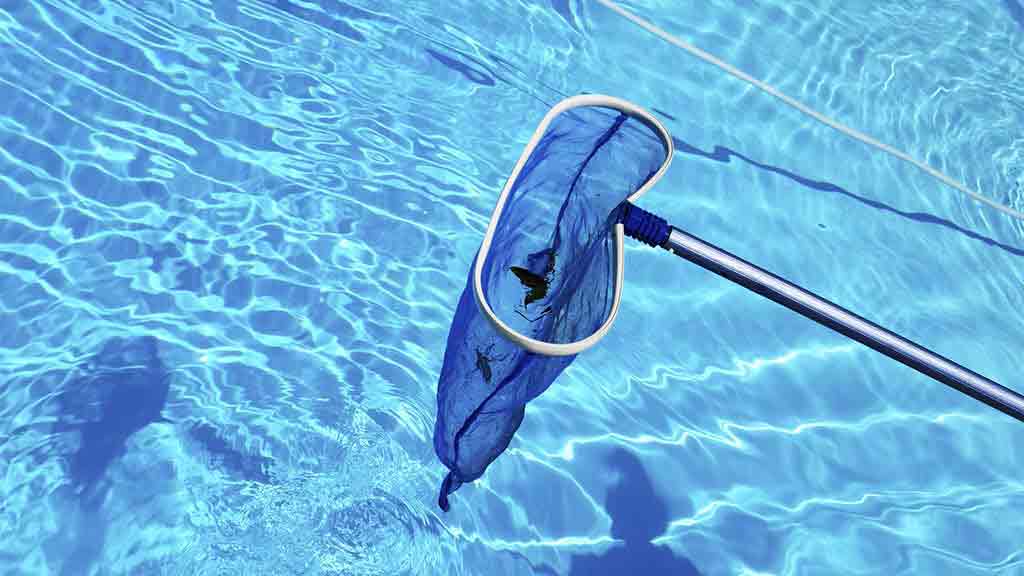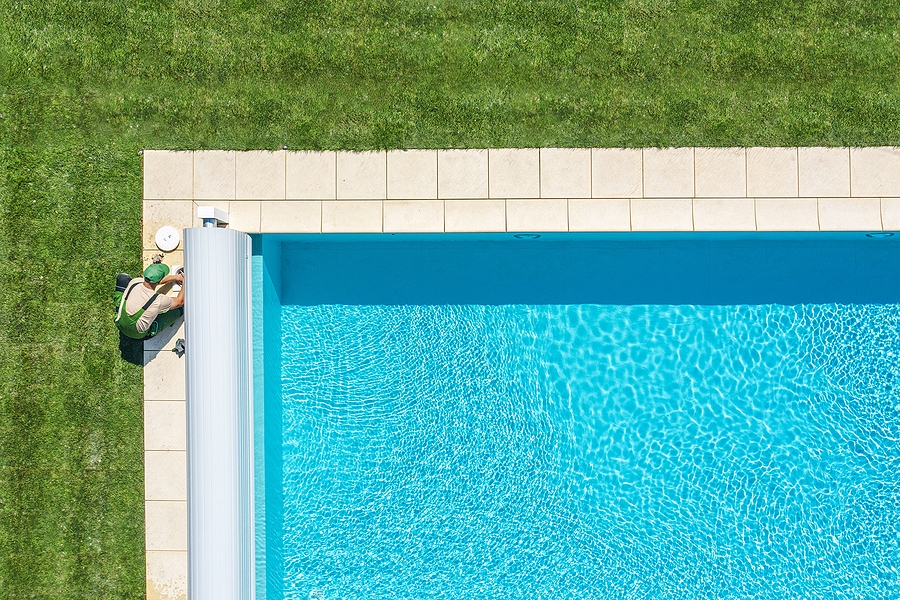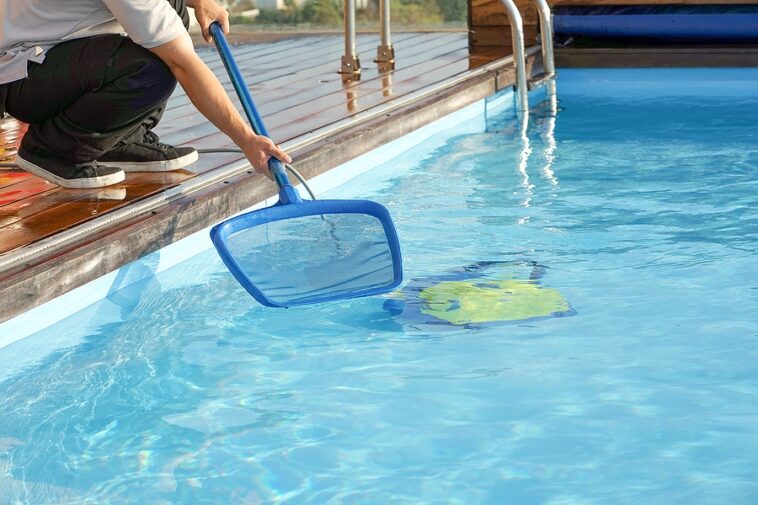Congratulations on becoming a new pool owner! Adding an in-ground pool is such an exciting project that will provide endless fun and memories for you and your family during the warm summer months. As you settle into pool ownership, be familiar with routine maintenance such as testing and adjusting chemical levels, cleaning, and minor repairs.
Also, educate yourself on the basic components of a swimming pool – the filtration system, pool pumps, heaters, cleaners, etc. – so you understand how everything works together to keep your water clean and safe. Follow this pool care guide to start enjoying life as a new swimming pool owner.
What Pool Equipment Do I Need?
Investing in quality pool equipment is crucial for easy maintenance. Here are some pool care essentials new owners should have on hand:
- Filter: Often at the heart of the system, the filter removes debris, particles, and impurities from your water. Common types are sand, cartridge, and DE
- Salt Water Chlorinator: It is a convenient alternative to manually adding chlorine to your pool. It uses the salt cell to convert the dissolved salt in the pool water into chlorine.
- Pump: Circulates water from the pool, through the filter, and then backs out the returns. Match the pump size to the pool volume for proper turnover.
- Skimmer: Collects leaves, bugs, and larger debris from the water surface and pulls them into the filter system. Necessary for cleaning surface grime.
- Heater (Optional): It allows you to use the pool in colder weather by maintaining a comfortable water temperature.
- Test Strips: Using these once a week, the strips will indicate if you need to add chemicals to stave off algae or bacteria.
- Pool Cover: It covers the pool when not in use to prevent debris from falling in and save chlorine levels.
The filter, pump, and saltwater chlorinator are absolute must-haves. The other equipment improves functionality and maintenance but may not be essential in all cases.
What Do I Need to Keep a Pool Clean?

To keep a pool sparkling clean, it takes a balanced combination of circulation, chemicals, and a bit of manual effort. Here’s a breakdown of the essential elements for ensuring your pool water remains crystal clear.
- Chlorine: The number one sanitiser, kills bacteria and prevents algae growth
- pH: Keeps water balanced and safeguards pool surfaces and equipment from potential damage.
- Alkalinity: Acts as a buffer for pH levels and provides stability to the sanitiser’s effectiveness.
- Shock: Burns organic compounds through oxidation to leave the water crystal clear.
- Filter cleaner: Removes oil, dirt, and calcium deposits from filter pores to enhance efficiency.
- Clarifier: Binds microscopic debris together for better filtration
- Brushing: Disrupts the buildup of biofilm and settles debris. so they get sucked into the filter
What Chemicals Are Needed to Maintain a Pool?
Maintaining proper swimming pool water chemistry involves using a combination of different chemicals and additives. The key elements are:
- Sanitisers: Chlorine and bromine work to eliminate bacteria, with bromine better suited for warmer water. Adding a chlorine conditioner helps protect against UV degradation. Consider a salt chlorinator system as a gentler alternative.
- Algaecides: Copper-based algaecides prevent algae growth on pool surfaces.
- Balancers: Alkalinity and pH balancers keep your pool water chemistry in check. Improper levels can lead to limescale buildup, cloudiness, and bacterial growth.
While DIY pool care is appealing for its cost savings, most new pool owners find that relying on professional maintenance services leads to better results in sustaining clear, clean, and healthy water. Pool service technicians handle all testing and chemical balancing, providing peace of mind that your pool chemistry is always optimised.
When/How Should I Close the Pool?

- Shut Down for Cold Weather: As temperatures regularly drop to 60 degrees Fahrenheit or below, it’s time to prepare your pool for winter storage:
- Test and Balance Water: Check pH and chemistry levels and make adjustments to avoid corrosion or scaling during the off-season.
- Clean Surfaces: Thoroughly brush, vacuum, and skim away debris to keep water fresh when opening in the spring season.
- Shock Treatment: Superchlorinate to sanitise all surfaces and clear any built-up organic matter.
- Partial Drain: Lower the water level but don’t fully drain to prevent ground shifting that could pop the pool structure.
- Remove Accessories: Take out ladders, hoses, cleaning tools, etc. to prevent weather damage.
- Seal Cover: Install a tight-fitting winter cover to keep out elements and debris until the next use.
Closing a pool properly each winter saves hours of preparation when reopening it the following swim season.
When/How Should I Re-Open the Pool?
- Wait for Ideal Conditions: When temperatures have consistently reached 65°F or higher, it’s time to reopen your pool:
- Remove Essentials Items: Take off the winter cover and replace any drained plugs
- Clean Filtration System: Manually wash out filters if needed per manufacturer recommendations before reinstalling.
- Fill and Circulate Water: Add water to reach normal levels. Turn on the pump and filter to start circulation.
- Run Filter and Brush: Switch the filter back on and brush all surfaces to remove any debris.
- Balance Chemistry: Have a pool professional test pH, sanitiser, and mineral levels and provide chemicals/instructions for protecting swimmers.
Patience is key when reopening a pool after winter. It can take multiple days or weeks to get crystal clear water, but regular testing and adjustments get it swimmable sooner. Consider hiring a pool service for a core spring cleaning to start the season off right.

Final Thoughts
Caring for a new pool takes some trial and error, but sticking to a routine based on your pool’s specific needs makes balancing easier over time. Testing water chemistry regularly, scrubbing surfaces, cleaning the filter, and shocking after heavy bather loads prevent most major issues. If your pool maintenance ever feels like too much to handle, don’t hesitate to utilise the expertise of a professional pool cleaning service. Consistent care will have your pool ready for endless summer fun all season long.




